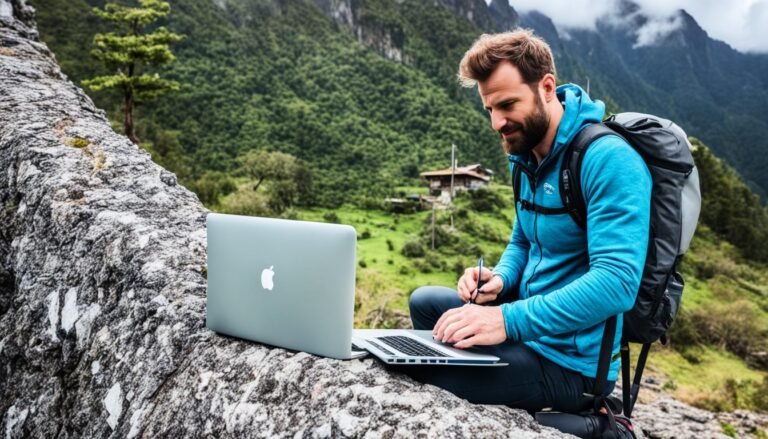Legal Considerations for Digital Nomads: Visas, Taxes, and More
Digital nomadism lets you work from beautiful places worldwide. But, it has its own legal challenges. Knowing about visas and taxes is key to follow the law and avoid trouble. Digital nomads need to understand international tax laws to keep their freedom and avoid fines. This guide will cover the main legal things digital nomads should know, like getting the right visas and handling taxes in different countries.
Key Takeaways
- Digital nomadism requires careful navigation of visas and tax obligations.
- Compliance with international tax laws is essential to avoid penalties.
- Understanding tax residency and the 183-day rule is crucial for digital nomads.
- Digital nomads must file U.S. tax returns if earning above the minimum filing amount.
- Advisory from a Board-Certified Tax Law Specialist is recommended for managing foreign account reporting requirements.
Understanding Digital Nomad Visas
Digital nomad visas are key for remote workers who want to travel and work at the same time. They let digital nomads work abroad without needing to live there forever. It’s important to know the work visa requirements to follow the law in each country. Let’s look at the different types of visas, how to apply, and which countries offer them.
Types of Digital Nomad Visas
Many countries have made special visas for digital nomads to attract remote workers. International work authorizations offer various benefits and can last for different periods. Here are some main types:
- Short-term digital nomad visas, usually good for up to a year.
- Long-term digital nomad visas, which can be renewed for years.
- Special mobility visas that let you visit many countries in a region.
Application Process for Digital Nomad Visas
To get a digital nomad visa, you must meet certain work visa requirements. Here’s what you usually need to do:
- Show proof of your job or self-employment online.
- Have enough money to support yourself financially.
- Have health insurance that covers you in the host country.
- Provide documents like your passport, background checks, and application forms.
Countries Offering Digital Nomad Visas
More countries are making changes to welcome digital nomads. Here are some that offer digital nomad visas:
- Spain: This visa lets you live and work in Spain for up to a year, and you can extend it for five years.
- Estonia: Estonia is a leader in digital nomad visas, with options for freelancers and remote workers.
- Barbados: The 12-month Barbados Welcome Stamp is perfect for remote workers who love a tropical setting.
- Germany: The “Freiberufler” visa is for freelancers, including digital nomads.
It’s crucial to understand digital nomad visas to smoothly move between countries and follow immigration laws.
Tax Implications for Digital Nomads
Remote work is on the rise, making taxes for digital nomads more complex. In 2022, 16.9 million US workers called themselves digital nomads, a 9% jump from the year before. This number is 131% higher than before the pandemic. Digital nomads need to know about taxes in both the US and abroad.
US Tax Obligations for Digital Nomads
US citizens must report all income they earn, no matter where they are. This includes things like wages, interest, dividends, and rental income. If they make over a certain amount, they need to file a US tax return. Using spreadsheets can help keep track of money made in different places. This makes sure they follow state laws and IRS rules.
Foreign Income Exclusion and Tax Credits
Digital nomads can benefit from the Foreign Earned Income Exclusion (FEIE). It lets them exclude up to $120,000 of income from US taxes if they work abroad for over 330 days a year. The IRS also offers the Foreign Tax Credit to avoid paying taxes twice on money earned in another country. Keeping accurate records of time spent abroad is key to getting these credits.
Reporting Foreign Financial Assets
Digital nomads with foreign financial assets must follow the Foreign Account Tax Compliance Act (FATCA). Not reporting can lead to big penalties. They might need to file the Foreign Bank Account Report (FBAR) and FATCA Form 8938. The IRS has a program called the Streamlined Foreign Offshore Procedures for those who haven’t filed on time but have lived abroad for at least 330 days in the last three years.
Understanding foreign income tax obligations and proper tax reporting for digital nomads is crucial. It helps avoid legal and financial trouble. Whether you do your taxes yourself or get help, staying informed is key to managing your taxes well.
Navigating International Employment Laws
For digital nomads, knowing international labor law is key. Laws on work vary a lot from one place to another. This knowledge helps keep remote work legal and smooth across the globe.
Compliance with Local Employment Regulations
It’s vital for digital nomads to follow local employment regulation compliance. About a third of OECD countries, like Italy and Japan, now support remote workers. But, places like Germany and the US haven’t made special programs for digital nomads yet.
Many OECD countries, like Canada, mix visitor visas with digital nomad programs. This makes following the rules harder.
Contract Considerations for Digital Nomads
When making digital nomad contracts, knowing the local rules is crucial. In some places, like Austria, remote work under visitor visas is limited. Ireland only lets you work for a home employer for 14 days in 90 days.
Countries like Thailand and Japan are starting special visas for digital nomads in 2024. This will make things clearer for freelancers and remote workers.
More OECD countries are making rules for remote workers. This helps reduce confusion and makes it easier for digital nomads. Companies are also setting clearer rules for remote work to protect themselves. Knowing international labor law and having good contracts can make working remotely smoother and safer.
Establishing Tax Residency
For digital nomads, figuring out tax residency is key to meeting their tax duties. They must meet certain tax residence criteria that differ by country. A major factor is the 183-day rule. This rule says if someone spends over 183 days in a year in a country, they’re usually seen as a tax resident there.
Understanding the 183-Day Rule
The 183-day rule is a simple way to check if someone is a tax resident. Many countries say you’re a tax resident if you’re in their country for more than half the year. This rule impacts where you file taxes, the tax rates you pay, and if you need to report foreign income. Knowing how the 183-day rule works worldwide helps digital nomads follow the law in each place they visit.
The Concept of Substance in Tax Residency
After the 183-day rule, the substance-over-form principle is also key in figuring out tax residency. This principle looks at real ties to a country, like family, property, or business. It checks if someone’s life is really linked to the country. Having strong ties can affect your tax residency status, which includes things like Social Security and Medicare taxes for self-employed digital nomads. Understanding these tax residence criteria helps avoid tax issues and follow international tax laws.
Managing Freelance Tax Obligations
Being a digital nomad means more than just working from anywhere. It also means handling freelance tax duties well. Knowing about self-employment tax is key for independent contractors.
Digital nomads must follow tax rules in each country they work or live in. This includes filing taxes, keeping records, and meeting deadlines. For those in the U.S., paying self-employment tax on earnings abroad is part of the job. This tax helps fund Social Security and Medicare for freelancers.
Many countries use the “183-day rule” to see if someone is a tax resident. If you spend 183 days or more in a country, you might be considered a resident. This rule is important for digital nomads to know.
Double taxation can happen when income is taxed twice, once by your home country and once by the work country. Double Taxation Agreements (DTAs) help avoid this. They make independent contractor taxation smoother. Countries also use withholding taxes on things like salaries and dividends, which helps non-residents follow the rules.
Digital nomads need to know about more than just self-employment tax and income tax. They should also understand taxes on profits from selling assets and Value-Added Tax (VAT) for business. Being a resident in a country doesn’t always mean you have to pay taxes there.
Some digital nomads can avoid paying Social Security in two countries with Social Security Totalization Agreements. For example, U.S. citizens in the U.K. might pay into the U.K.’s National Insurance instead of the U.S.’s Social Security.
“The single most important aspect of managing freelance tax obligations is staying informed and organized,” says tax expert Jane Brown. “Understanding your tax responsibilities in every country you operate in is crucial.”
Many countries offer special deals or visas for digital nomads. For example, Barbados has a “welcome stamp” that lets you work without paying local taxes for a while. Following these laws and using these benefits helps you stay legal and save on taxes.
Legal Requirements for Remote Workers
For digital nomads, knowing the legal requirements for remote workers is key. It’s important to follow remote work compliance and virtual employment laws in host countries. This balance is crucial while looking at international remote work policies.
- Many countries let remote workers stay for 90-180 days without a work visa, making it easier to live as a digital nomad.
- After this period, remote workers might consider digital nomad visas for 6, 12, or 24 months.
- Employers might have a Digital Nomad Policy that outlines what remote workers can do to follow the rules.
Remote work rules vary by country. For example, Malaysia requires an income of $24,000 USD for digital nomads. Italy limits its digital nomad program to “highly professional and digital” tasks. This shows how virtual employment laws can differ.
Armenia and Uruguay offer special options like temporary residence cards and short-term stays with extensions. Remote workers must show proof of job offers, qualifications, and financial stability to meet these rules.
Many places require remote workers to have personal health insurance while abroad. Tax rules for remote workers also vary, with some getting tax exemptions under certain conditions. For instance, non-US citizens working for US companies abroad pay taxes in their home country.
Form W-8BEN proves the tax residency of non-US citizens outside the US. This form often exempts them from filing a US tax return with the IRS. It makes tax duties simpler for remote workers following laws of both their home and host countries.
Remote workers usually can’t work in the local economy unless the host country says it’s okay. Following these rules helps ensure a smooth work experience and avoids legal issues.
Global Citizenship and Its Impact on Legal Compliance
More and more digital nomads are on the move, with 15.5 million Americans joining the crowd in 2021. This shift changes how we think about legal rules and international agreements. Digital nomads are changing the way we work and affecting tax laws and legal duties across borders.
Knowing about global citizenship helps digital nomads move easily between countries. They learn about their rights and duties. This knowledge helps them follow tax laws and avoid paying taxes twice.
Now, over 3,000 tax treaties help prevent double taxation and make it easier to work across borders. The OECD Guidelines also offer solutions for the digital economy’s challenges.
Digital nomads need to understand tax laws in their home and host countries. They must know the legal rules for expatriates. This knowledge lets them support the local economy by spending money on things like housing, food, and fun.
Being a digital nomad also means you can work from anywhere. This leads to a 13% boost in productivity for remote workers. It shows that living and working abroad can be good for both your career and personal life.
In short, knowing how global citizenship affects legal rules helps digital nomads meet their legal duties. By following international tax treaties, they can succeed in the changing world of remote work.
Work and Travel Visa Regulations to Note
For digital nomads, knowing about work and travel visa regulations is key. There are different visas for short and long stays. This section will guide you through these rules.
Short-Term vs Long-Term Visa Options
Short-term visas let you stay up to 90 days. They’re good for short projects or checking out a place. Long-term visas, on the other hand, last from one to two years and can be extended up to five years. They’re perfect for digital nomads who want to stay in one place longer.
Long-term visas also have income requirements, which can be from $2,000 to $5,000 a month. Some countries, like Germany and Portugal, have special visas for digital nomads. Germany’s visa costs between €75 and €110, while Portugal’s costs range from €80 to €90, plus a €120 processing fee.
Common Requirements Across Countries
When dealing with expatriate visa requirements, there are some common things you’ll need. You’ll usually need proof of your job, enough money each month, and health insurance. For example, Estonia’s digital nomad visa, the D-Visa, costs €100 and requires proof of enough monthly income.
Applying with family members also has its own rules, like Barbados’s “Welcome Stamp” visa. It costs $2,000 for one person and $3,000 for families. Knowing these details helps digital nomads meet all the requirements and move smoothly between countries while following the law.
The Role of Digital Nomads in the Global Economy
Digital nomads are changing the global economy in big ways. They show a 13% rise in productivity thanks to flexible remote work. This effect goes beyond just more work done. It boosts tourism and helps local economies in places they choose to live.
Countries like Spain, Portugal, Greece, Costa Rica, and the Cayman Islands are embracing global work trends. They offer special visas for digital nomads. For instance, Spain’s visa needs proof of income for three months and a certain income level. Brazil’s visa requires a minimum income of $1,500 USD or $18,000 USD in savings. These visas show how important digital nomads are for local economies.
Companies are also jumping on the remote work bandwagon. They see the perks of having workers from different places. Over 25 countries and territories have started “digital nomad” visa programs by June 2022. This shows how big the demand is.
The COVID-19 pandemic sped up the move to remote work. It changed immigration rules. Governments are now making new visas for remote workers and freelancers. This change could bring big economic benefits to areas that attract these workers.
Digital nomads save money on things like commuting and housing. This means they have more money to spend locally. This helps local businesses and supports the growth of remote work.
Key Strategies for Tax Planning as a Digital Nomad
When planning taxes as a digital nomad, focus on the right business structure and social security agreements. These areas are key to your financial and legal health while working remotely.
Choosing the Right Business Structure
Business structure optimization is key for digital nomads with varied income and responsibilities. The right structure limits liability, boosts tax efficiency, and simplifies operations. Countries like Estonia, Portugal, Singapore, and the UAE offer great conditions for businesses.
In Estonia, the e-Residency program gives EU market access with low corporate taxes. In the UAE, setting up a company offers big tax benefits. But, consider local tax laws in your home country to know if US-sourced income is taxed.
Analyzing Social Security Totalization Agreements
Social security totalization agreements are crucial for digital nomads, especially US citizens or Green Card holders. They help avoid double social security taxes and protect workers’ benefits. With more digital nomads, understanding these agreements is key.
Countries like Italy, Germany, and Switzerland have agreements with the US. These agreements exempt self-employed digital nomads from SECA tax. This helps reduce tax liabilities and improve financial planning.
Not following tax laws can lead to fines, interest, legal trouble, and damage to your reputation. With changing tax laws and more scrutiny on remote work, digital nomads must stay informed and proactive. Using a virtual mailbox service like Travelling Mailbox helps with correspondence and keeps a professional image while traveling.
Conclusion
In conclusion, becoming a responsible digital nomad requires understanding visas, taxes, and work laws. It’s important to know how to get the right visa and follow tax rules. This knowledge is key for those who work remotely.
Knowing about legal and tax matters is crucial. Digital nomads, whether they work for themselves or others, need to understand contracts and taxes. It’s important to have clear contracts that cover things like work duties, how to pay, and who owns what.
Remote work means keeping up with tax rules and knowing about the 183-Day Rule. It’s also good to think about the pros and cons of different business types. While companies can help with taxes, working alone means you have more tax duties. So, planning ahead and following the law is a must.
The digital nomad world is growing fast. Staying informed about these details helps avoid legal problems. This way, digital nomads can enjoy their lifestyle without legal worries.
Source Links
- An Overview of Digital Nomad Visa and U.S. Taxes (2024)
- Digital Nomad Taxes: 10 Things Americans Abroad Should Know
- Digital Nomad Taxes: 8 Things You Need to Know
- The employer’s guide to managing digital nomads
- Where Digital Nomad Visas Miss the Mark
- Digital nomad taxes – working remotely while traveling
- Remote Work: Navigating Digital Nomad Visas and OECD Regulations
- How to manage taxes, visas, and more to travel while working remotley— and why some ‘digital nomads’ are ignoring the rules
- Digital Nomad Taxes: A Complete Guide for US Nomads
- Digital Nomad Taxes: How to Legally Travel & Work Remotely
- How to Choose a Residence Country as a Digital Nomad Entrepreneur
- Digital Nomad Taxes: Everything You Need To Know
- Digital Nomad Taxes: What Employers Need to Know
- Global Mobility to Retain Remote Workers – Klasko Immigration
- Can Non-US Citizens Work for US Companies and Live Abroad?
- Digital Nomadism and Taxation: Navigating the Evolving Landscape
- Digital Nomad Visas: How to Benefit From the Global Mobility Trend
- Global Digital Nomad Report – Global Intelligence Unit
- Digital Nomad Visa – Countries Offering Visas for Digital Nomads
- Your Guide to Digital Nomad Visas Around the World – doola: Start your dream US business and keep it 100% compliant
- Working Remotely from Another Country: Key Things to Know | EPAM Anywhere
- Digital Nomad Visas: The Global Mobility Trend
- The Future of Remote Work: Digital Nomads and the Implications for Immigration Systems
- Navigating Tax Residencies and Tax Havens for Digital Nomads: A Comprehensive Guide to Tax Efficiency
- Digital nomad tax guide | TFX
- Legal Things For Digital Nomads: Complete Guide
- Digital Nomads And Income Tax – Why It Is A Bad Solution







